In many survival situations, a firearm would have significant value. And in some situations, it could be of critical value. For each potential use, there is a “best” type of firearm, but unfortunately, there is no firearm effective for all uses. The shotgun is about as versatile a firearm as exists. It usually fires a bunch of small balls (the “shot”), but can fire a single projectile the size of the bore (a “slug”) or even other things (flares, non-lethal projectiles, rock salt, etc).
 There are two primary classes of survival usage for a shotgun: hunting and defense. With the appropriate ammunition, a shotgun is effective for hunting small, medium and large game, as well as birds of all sizes. And there is not much which would be better at defending yourself from man or beast at close range. But there are “costs” for this versatility, which keep true the earlier statement about there being no universal firearm. The ammunition is big and heavy, magazine capacity is small, reloading is slow, effective range is fairly short, and shotguns are not particularly concealable.
There are two primary classes of survival usage for a shotgun: hunting and defense. With the appropriate ammunition, a shotgun is effective for hunting small, medium and large game, as well as birds of all sizes. And there is not much which would be better at defending yourself from man or beast at close range. But there are “costs” for this versatility, which keep true the earlier statement about there being no universal firearm. The ammunition is big and heavy, magazine capacity is small, reloading is slow, effective range is fairly short, and shotguns are not particularly concealable.
Gauge
When looking at any firearm, the first consideration is the “size”, or diameter of the ammunition, which is a major factor in defining its potential effectiveness. In shotguns, this is usually specified as “gauge”, an obscure unit of measurement determined from the weight of a solid sphere of lead that will fit the bore of the firearm. The most common shotgun gauges, from big to small, are 12 gauge, 20 gauge and 410, which is not actually a gauge but a caliber in inches. To illustrate how gauge is measured, a one-twelfth pound lead sphere fits a 12-gauge bore. Which is not really much help to most people; for a more generally useful measure, the bore of the 12ga is 0.729″, 20ga is 0.615″, and the 410 (NOT also known as 67.62ga) is, of course, 0.410″. Since the shotgun usually uses many small projectiles rather than one large projectile, the actual diameter of the bore is often not constant, and the muzzle can be “choked” smaller than the “official” diameter.
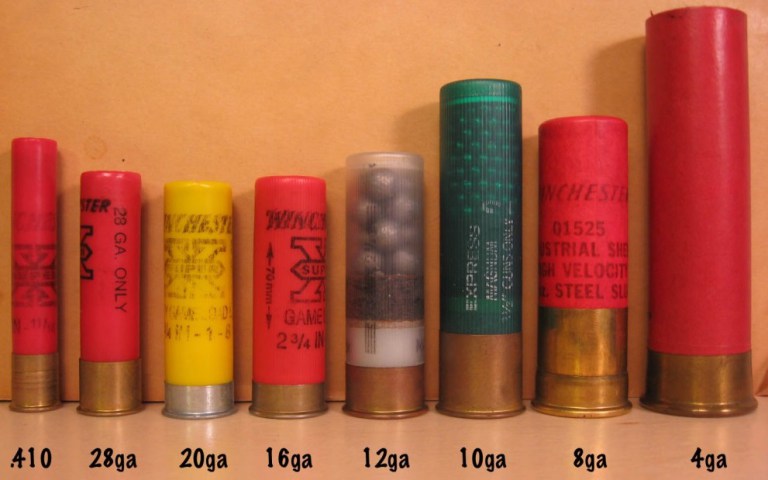
There are many different options for shotguns, but the 12, 20 and 410 are the most popular in the U.S..
The most effective and versatile of the common choices is the 12ga, but it may have a bit too much recoil for some folks. The 20ga is an adequate alternative if the 12ga is just too much. As for 410, it is pretty much a “specialty” choice, where the gun is the deciding factor rather than the gauge. There are a few handguns which will fire this, as well as some compact long guns, including ones with a 410 barrel and a rifle barrel. Besides the “common” gauges, there are others available, including 10ga, 16ga and 28ga (between 20ga and 410), which may be perfectly reasonable or even preferable in normal times, but ammunition is just too limited in availability and variety to be depended on for survival usage.
Action
The next consideration is the action. Shotguns are available in single barrel and double barrel (both over and under, and side by side) configurations. These are simple and rugged (and less politically incorrect), but that second (or third) shot is just too slow for some situations. More practical are pump actions and semi-automatics. The semi-auto can be quite useful, but are often also a bit more complex, more expensive, and may be more ammunition sensitive than the pump, and some models have part of the mechanism in front of the magazine, which makes for an extra limited and non-expandable magazine capacity. Others, such as the Remington 1100 and the Benelli M2, have a standard, extendable magazine tube. There are a few shotguns with other actions, such as lever-action and double action revolver, which might also be adequate, and bolt-action, which seems too slow to be a first choice.
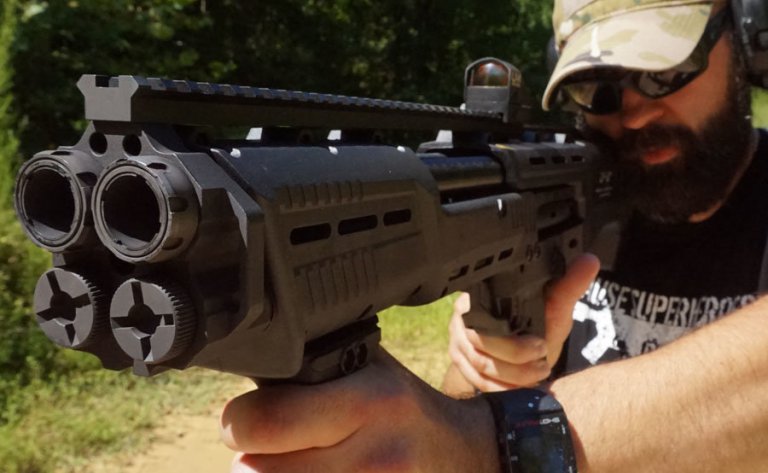
The pump shotgun is a good all around choice and often fairly inexpensive. The Remington 870 and the Mossberg 500 seem to be the most common, but there are some other good choices out there. If you get a fairly common, modern, brand and model, your chances of having a good selection of accessories and parts upgrades are likely to be better.
Most repeating shotguns are fed from a fixed tube under the barrel (the KelTech and the UTAS have TWO tubes for twice the capacity); a few use a detachable box magazine or cylinder or drum which allows for a speedier reload.
One advantage of the single barrel or double barrel break open shotgun is you can slide an adapter into the barrel to shoot a smaller gauge shell or even a rifle or pistol round. In order to get decent accuracy with rifle or handgun calibers, you will want to get one at least 7″ long and with rifling (except for 20ga and 410 adapters). X-Caliber claims to have them in .223, 7.62×39 and .308, but I could not find any, so they may have been withdrawn. Chiappa sells an X-Caliber set with just the pistol calibers and shotgun gauges. There are several other companies which to sell these sorts of adapters.
Chokes
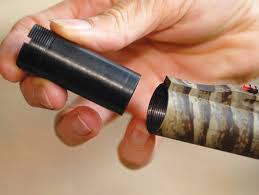
Changing the Choke on a shotgun.
As mentioned, the diameter of the barrel can vary from end to end. It starts off at the standard diameter of the shotgun shell and immediately has a “forcing cone” to get the shot down to the “official” size. The bore may then expand slightly to reduce recoil. When it gets to the end of the barrel there is a tapered “choke” to compress the cloud of projectiles to the desired size. This choke can be built into the barrel, a screw-in choke tube, or an add-on adjustable choke. The more the amount of choke, the tighter the pattern which the cloud of shot will have, extending the range at which there are not excessive gaps between the pieces of shot. The common chokes, from most open (largest) to tighter (smaller) are: Cylinder (Cyl), Improved Cylinder (IC), Modified (Mod), Improved Modified (IM) and Full. There is also Skeet 1 (between Cyl and IC, AKA just Skeet) and Skeet 2 (between IC and Mod, AKA Light Modified), as well as Extra Full and several sizes of Turkey which are even more tight. There are also special purpose chokes, such as “duckbill” chokes which squeeze the shot into a wide bar rather than the normal circle, and breaching chokes used to get though a door by destroying the hinges (using special ammunition).
Note that it is not the SIZE of the choke which matters, but the DIFFERENCE between the bore right before the choke and the choke diameter. Since some makers “overbore” the barrel, two guns with the same choke could actually shoot differently. You can check what choke you REALLY have by shooting at a 30″ circle 40 yards away. Figure the percentage of shot inside the circle and that defines the choke. 40% is what Cyl is supposed to provide, up to 70% for Full.
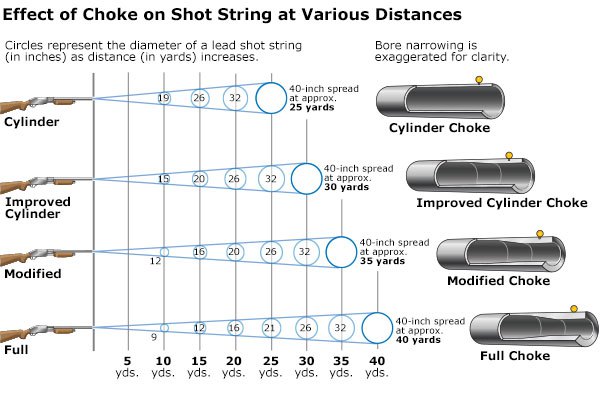
Shotgunning Chokes and range
It should be obvious that if you are shooting a solid projectile, you will want a Cylinder bore. This will also work with shot at short ranges, but allows too much “spread” in the “pattern” of shot for use on small targets at longer ranges. Modified seems to be a common “general purpose” hunting choke. If you have a specific purpose in mind, then you can get exactly the choke most appropriate, but in a survival situation, this could be problematical. I would prefer to have an add-on, adjustable choke, or at least a set of choke tubes to include a minimum of Cylinder (for slugs and defense), Modified (for general small game and bird hunting) and Full (for longer distance). Better would be to also include Improved Cylinder and Extra Full, and possibly a Turkey. With choke tubes, don’t forget to have the wrench to change the chokes, and to avoid damaging them, a case, belt pouch or protective tube would be a good idea.
Barrels
One of the advantages of most pump shotguns and many semi-autos is that the barrels are easily interchangeable. Short barrels are handy in close quarters, rifled barrels increase accuracy with slugs, and longer, choked barrels are best for hunting with shot. Most practical would seem to be a two barrel set, with a short barrel for defense and hunting with slugs, and a long barrel with adjustable choke for other hunting. Perhaps a third, medium length rifled slug barrel would increase your large game hunting range.
Note that by law, the absolute shortest barrel you can have is 18″, and this or 20″ is good for defense. For longer ranges, a longer barrel is easier to hit with, but heavier and harder to maneuver. 26 to 28 inches seems to be a good compromise. Of course, it is not strictly true that you can’t have a barrel less than 18″; it is sometimes possible if you don’t mind the costs and annoyances, and there are circumstances when it would be quite handy to have a more concealable shotgun. If you want to buy, or make a Short Barrel Shotgun (SBS) by cutting down a barrel (preferably an extra one), in some cases you can do this legally by getting the $200 NFA (National Firearms Act) tax stamp. If the registered SBS does not have a stock, it may qualify as an AOW (Any Other Weapon), which requires a $5 transfer tax stamp. This is a complex area of law, and you should make doubly sure of all current federal, state and local laws before proceeding. Failing to follow all laws and fulfill all requirements could have extremely unpleasant consequences.
Stocks
Most shotguns have some form of shoulder stock, which aids in accuracy and recoil control. This can be a fixed stock of wood or synthetic material, a collapsing or folding stock, or even only a pistol grip, as long as the overall length of the shotgun is not less than 26″ (unless the appropriate tax stamp, as described above, is acquired). Sometimes a standard stock has a pistol grip built-in, for more control. The most versatile option would be a pistol grip to which a stock could be easily attached. I’ve heard of something from CAA (Command Arms Accessories) which looks like it might provide this, but I have not seen one in person to verify if that is the case, or how sturdy is the attachment. Both Remington and Mossberg offer versions of their shotguns which have assorted stocks which can be changed without tools. The Remington MCS system only works on the MCS model 870, which appears to come with a set of barrels from 10″ to 18″, meaning it is a NFA weapon which will cost three times as much and require a tax stamp. The Mossberg FLEX system appears to be compatible with all model 500 shotguns. As an alternative, a folding stock may be adequate.
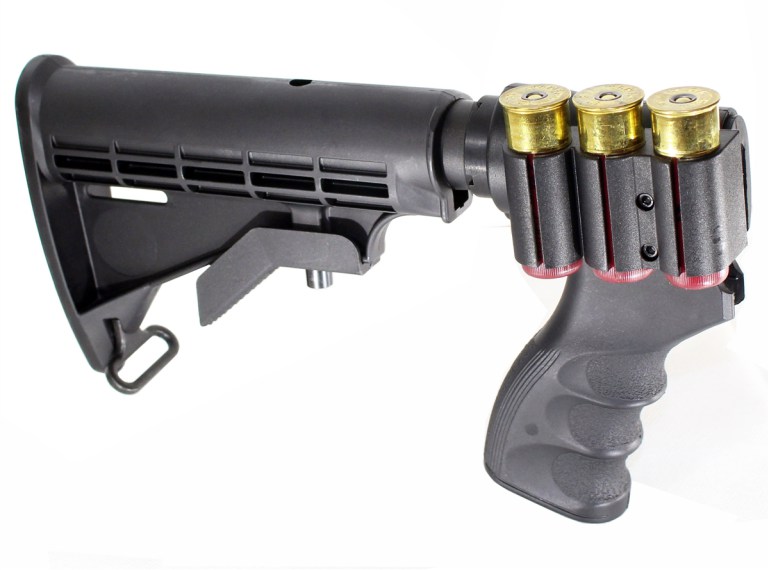
Most modern shotguns allow for easily modifying your stock options.
If I was looking for a stock, I’d investigate the CAA one, since in an emergency situation, sometimes you’d want the best accuracy of a stock and sometimes you’d want the compactness of a pistol grip, and folding stocks tend to be uncomfortable to use extended, and bulky when folded. If the CAA did not meet my requirements, any standard synthetic stock would do, and for that matter, the original wood one is quite adequate. As for a stand-alone pistol grip, in my day, the Pachmyer one was a top choice; but the price seems to have gone up considerably. If I were getting a pistol grip today, I’d look at the Hogue one with matching forend. It looks to be similar in feel and recoil reduction to the Pachmyr, with a more ergonomic shape and a much lower price.
Modifications
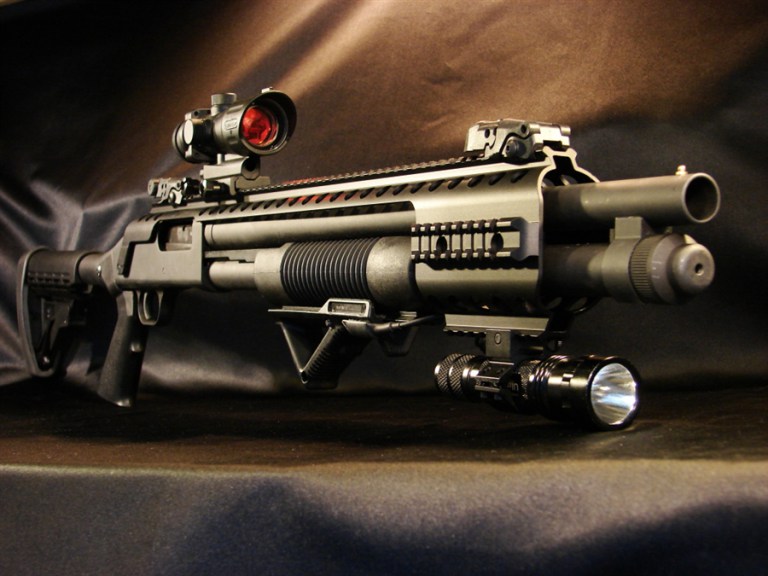
Generally, the shotgun you get is adequate for sporting use as is, but most can be improved, to increase its usability or versatility. The first thing to check is the fit of the stock. Assuming you don’t normally wear thick armor, if you hold the shotgun in your hand as you would when firing it, and lay the stock along your forearm, the buttplate should be against your upper arm when it is at a right angle to your forearm. If this is not the case, look into cutting down the stock or adding spacers until it fits. While you are at it, consider upgrading to a good recoil pad and/or recoil reduction system and include that in your fit modifications. Note that an adjustable stock would be handy to allow adjustment to different clothing or conditions.
At times you will want to be able to carry the shotgun without using your hands, so a sling, or scabbard, would be a good idea. The simplest sling is a standard (two point) sling, attached at the butt end of the stock, and to the front of the shotgun. Make sure it has enough adjustment to be usable under any reasonable conditions. This type of sling can be slow to put into action though, so another option is the single point sling, which is attached to one point near the receiver of the gun, and the gun just hangs down and can flop around, perhaps too much. The best choice might be a sling which converts from single point to two point, so you can choose which characteristic is more appropriate. Connecting the sling to the butt end is pretty straightforward; there will be an attachment point or you can install one very simply by drilling an appropriate sized hole in the stock or by installing an adapter between the stock and the receiver. Connecting to the front end can be more of a challenge. You may have to clamp something around the barrel, or screw something into the magazine tube cap. GG&G has some nice ones held on by the magazine tube cap. If making changes to the gun is not desired, you can use a “universal” mount which just has a strap which cinches around the stock or barrel.
Tune in next time for more simple modifications, and some thoughts on ammunition.
by John Hertig

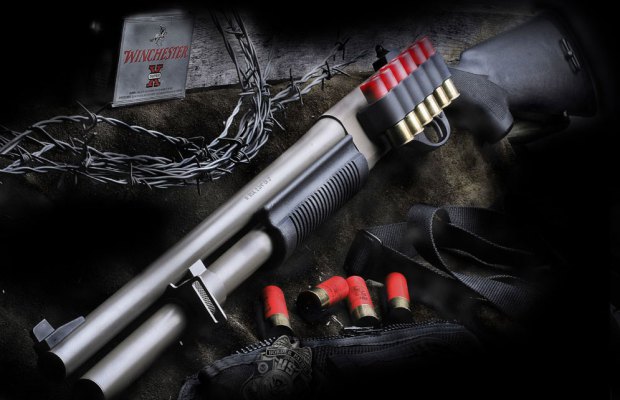



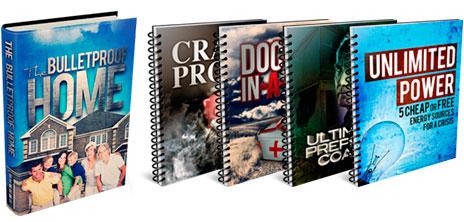
Another great article on the Prepper Dome website. Shotguns are versatile tools for self defense. I prefer the K.I.S.S method when selecting any firearm. One doesn’t need all of the bells and whistles when selecting a firearm, particularly a shotgun. Just because there are multiple aftermarket attachments and gizmos out there, we don’t need them all. I like my Mossberg 500 Persuader because it operates just fine right out of the box without any modifications or other gadgets attached to it. It has a 20″ barrel, open cylinder bore, and loads up to 9 rounds, 8 in the magazine 1 in the chamber, of 2 3/4 inch shells or 7, 3 inch shells. Buckshot, slugs, or birdshot, it takes them all. And I can mix and match all three for whatever a particular situation calls for, without changing barrels or chokes. The bore is not threaded for choke tubes. It fits me without any modification whatsoever. My wife had the opportunity to experience operating the chainsaw version of the Mossberg 500 in 12 gauge, and even though she is a bit shorter than I am, she handled it beautifully with no reluctance, fear, or getting thrown back 30 feet like you see in the movies. (It’s all special effects folks). Whatever you choose to use, learn how to use it. Just like with automobiles, each one is different and has certain requirements, particularly when it comes to regular maintenance. That’s why our guns come with owner’s manuals. Read and heed them. Also I would recommend not only basic training, but advanced training with firearms. The more proficient we are with them, the more of an advantage we have over our adversaries. And you can bet there are adversaries out there who pose a serious threat to us, whether we want to realize it or not. They are better equipped and better trained than what some of we are (ISIS, Al-Qaeda, Iranian Republican Guards, etc.) just to name a few but you get the idea. Even in our larger metropolitan cities, there are gang members who have served in various branches of the military, if even for a short period, who have had extensive weapons training, who could collaborate with our foreign enemies. I personally served with gang members when I served in the Navy. Keep expecting the unexpected. Vive Le Résistance.